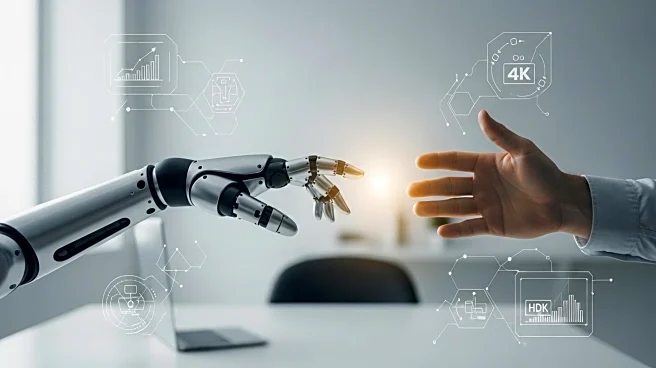What's Happening?
John Callahan, CTO and president of AI company Partsol, has raised concerns about the impact of artificial intelligence (AI) on the workforce. He emphasizes that the real risk is not AI replacing jobs, but rather creating an unequipped workforce. Many companies have rapidly adopted AI technologies, particularly generative AI, without a clear understanding of their business needs, leading to underwhelming results and a lack of internal expertise. Callahan suggests that organizations need to invest in their workforce and adopt a strategic approach to AI integration to remain competitive. He notes that while AI can automate certain tasks, human skills such as creativity and emotional intelligence remain crucial. The emergence of new roles like AI safety testers and ethics specialists indicates the evolving job market, where professionals need to diversify their skillsets to include AI education.
Why It's Important?
The integration of AI into the workforce has significant implications for U.S. industries and the economy. As AI becomes more prevalent, companies that fail to equip their workforce with necessary skills may face setbacks, impacting their competitiveness and innovation. The shift towards AI-driven roles highlights the need for education and training in AI-related fields, which could lead to job creation and economic growth. However, there is a risk of widening the skills gap if organizations do not address the need for workforce development. This situation underscores the importance of strategic planning and investment in human capital to harness AI's potential benefits while mitigating its challenges.
What's Next?
Organizations are expected to reassess their AI strategies and focus on workforce development to adapt to the evolving job market. This may involve implementing training programs and educational initiatives to equip employees with AI-related skills. Companies that successfully integrate AI while maintaining a skilled workforce could gain a competitive edge. Additionally, there may be increased demand for roles that require both technical skills and human judgment, such as AI ethics specialists and data annotators. As AI continues to shape the job landscape, professionals and companies must embrace change and innovation to thrive.
Beyond the Headlines
The ethical implications of AI integration in the workforce are significant. As AI technologies advance, there is a need to ensure that they are implemented fairly and responsibly, avoiding biases and ensuring equitable access to opportunities. The development of roles focused on AI ethics and safety highlights the importance of addressing these concerns. Furthermore, the cultural shift towards digital literacy and AI education may influence societal attitudes towards technology and innovation, potentially leading to long-term changes in how work is perceived and conducted.









